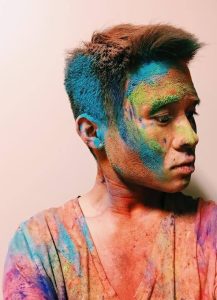I attempted to tell my parents of my sexual orientation on a chilly March night. It was roughly a year and a half ago. I met a guy online, and one Friday night we went on a date behind my parents’ back. The date ended in a disaster because he had parked his car in a garage that was already closed and as a result, we were escorted to the police station for trespassing.
I had lied to my parents about where I would be going out as this police station was over an hour away from my town. My furious parents arrived at the police station at midnight. As I got into the car with them, they demanded the facts. Overcome with emotion, I knew I could not lie about myself to them anymore. I blurted “mom, dad… I’m gay.”
Upon hearing those words, my mom began to sob profusely. My dad, stunned, went silent.
Throughout the remainder of the car ride, I was confronted with a barrage of questions in between my mother’s sniffles and periods of awkward silences.
“If you’re gay, does that mean you want to wear dresses?”
“How do you know you’re gay? You’re so young!”
“Did you guys have sex? You could get a disease!”
“You withdrew over a hundred dollars from your bank account. Was this money for condoms?”
I tried my best to answer these questions to the best of my ability. However, even after answering their questions, my parents did not (and still do not) understand my sexual orientation.
My parents have tried (and still are trying) to convince me that I’m confused and that I’m straight—they don’t want me to be gay. While it pains me to know they are still struggling to accept me for who I am, I know they still love me and that their skepticism with homosexuality is out of love. As my parents, they want and think they know the best for me. The discrimination and negative connotation of homosexuality that still occurs in present day society exists because of various stereotypes, all of which can be disproven with proper awareness and education.
One common stereotype is that most members of the gay population have AIDS and HIV, and that these sexually transmitted infections are only transmitted through anal sex. This belief is false as these diseases are spread when bodily fluids (such as blood or semen) containing the virus come in contact with another human being, or two partners are having unprotected sex and one partner is infected. HIV and AIDS can also be transmitted in blood transfusions, therefore, anyone is at risk of obtaining the virus, not just gay people.
Another prominent stereotype is the myth that all gay men are girly and feminine and all lesbians are masculine and “butch.” This generalization is rather ignorant because within the heterosexual population, there can exist more “metrosexual” males, less traditional “masculine” males, more “tomboyish” females, and less “girly” females. In the LGBTQ population, there are men and women who enjoy the arts and fashion, as well as men and women who actively play and follow sports. In fact, there are even men and women who like all three.
Having a sexual preference for a certain gender does not completely dictate what your interests are or who you are as a person. Society, unfortunately, in the past has informally established guidelines regarding what is expected of men and women. As a result, men and women who do not follow these guidelines can be subject to bullying and discrimination.
Along with stereotypes, traditional beliefs against homosexuality, outlined in many religious texts forces many to conceal their sexual identity. Loved ones have conflicting opinions from other loved ones, and sometimes many LGBTQ need to hide their identity from those closest to them in an effort to avoid being disowned or to make their living experience more bearable. I was raised in a Catholic household, and my parents believe that as written in the Bible, homosexuality is against what God wants. However, faith depends on the individual—we all reserve the right to believe what we want to believe. There are many gay Christian communities, churches, and support groups that help homosexuals love themselves as well as those around them.
On campus at NJIT, there are other resources for LGBTQ students, such as Spectrum, the gay straight alliance. On Fridays, there is a group known as the “Out and About Group”, which consists of a group of students learning to live with their sexual orientation; whether it be dealing with parents, self-acceptance issues, or even just finding a place to freely and safely talk about their sexual orientation.
Not only are support groups a great way to feel more comfortable and safe with sexual orientation, but also just being honest and open with many of your friends helps a lot. The youth of today’s generation has become more progressive.
Many men and women who identify as LGBTQ hide their sexuality in fear of being ostracized and discriminated against by society. The stereotypes and conflicting religious beliefs surrounding LGBTQ people definitely forces individuals to hide their sexual orientation and to be less honest with their loved ones. However, when one opens their heart and mind and freely confesses their sexuality, coming out of the closet is a beautiful act of courage. Despite the misconceived notions and opinions of many out in the world today, there is no fear of self-expression and honesty.
The diversity of humanity on planet Earth is not limited to gender, ethnicity, religious background, race, and more recently, sexual orientation. With so many ways for man to be different from each other, life is more interesting, and we need to celebrate our differences as they will allow us all to grow and learn from each other.
As we celebrate everyone’s diversity, however, one fundamental fact is clear: love is love, and it knows no gender.
Published in issue 7, in the week of October 20, 2014.





























